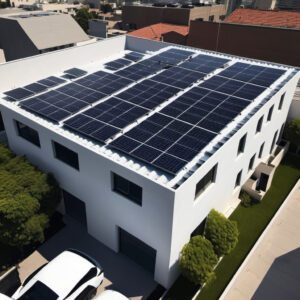A Path to Sustainability and Cost Savings
As businesses around the world strive to reduce their carbon footprints and lower energy costs, the commercial sector has increasingly turned to solar energy as a viable and sustainable solution. With the growing demand for environmentally-friendly practices and the need to control operational expenses, solar power is not just a trend, but an essential investment for the future of commercial industries. In this blog, we will explore why solar energy is the future of commercial industries, highlighting its benefits, cost savings, and role in achieving long-term sustainability.
The Growing Need for Sustainable Energy in Commercial Industries
The commercial sector is one of the largest consumers of energy, and as industries continue to expand, so does their energy consumption. In response to climate change and the need for more sustainable practices, businesses are increasingly recognizing the importance of reducing their reliance on traditional energy sources like coal, oil, and gas.
Solar energy offers a solution that aligns with both environmental and financial goals. By harnessing the power of the sun, companies can significantly reduce their reliance on the grid, lower energy costs, and contribute to a more sustainable future. The global shift towards renewable energy sources is not just a response to environmental concerns but also a smart business decision for those who want to stay competitive in the ever-evolving marketplace.
Key Benefits of Solar Energy for Commercial Industries
1. Cost Savings and Energy Independence
One of the most compelling reasons for businesses to adopt solar energy is the potential for substantial cost savings. With traditional energy sources, companies often face unpredictable energy prices and rising costs. Solar power, on the other hand, allows businesses to generate their own electricity, which leads to lower utility bills and more predictable energy expenses.
In fact, studies have shown that solar energy can save businesses up to 75% on energy bills over time. This significant reduction in energy costs directly impacts the bottom line, freeing up funds that can be reinvested into other areas of the business, such as research and development or employee training.
Moreover, many governments and local authorities offer incentives such as tax credits, rebates, and grants to businesses that choose to install solar panels. These financial incentives make solar energy an even more attractive option for businesses looking to reduce their operational expenses.
2. Long-Term Financial Benefits
The initial investment in solar infrastructure may seem daunting, but the long-term financial benefits far outweigh the upfront costs. Most solar systems come with warranties ranging from 20 to 25 years, ensuring that businesses will enjoy decades of cost savings. The combination of energy independence, lower maintenance costs, and available financial incentives makes solar power a smart and profitable investment for commercial industries.
Additionally, solar systems increase the value of commercial properties, making them more attractive to potential buyers or tenants. A building equipped with solar panels is viewed as more energy-efficient and environmentally friendly, making it a desirable asset in today’s green-conscious real estate market.
3. Environmental Impact and Corporate Social Responsibility (CSR)
Corporate Social Responsibility (CSR) is becoming a key driver of business decisions, especially in the commercial sector. Companies are under increasing pressure to adopt sustainable practices and reduce their environmental impact. By switching to solar energy, businesses can significantly cut down on their carbon emissions and reduce their dependency on fossil fuels.
Solar power is a clean, renewable energy source that doesn’t contribute to air pollution or greenhouse gas emissions. By adopting solar energy, commercial industries can take a stand against climate change and demonstrate their commitment to environmental sustainability. This can enhance a company’s brand image, build trust with consumers, and improve relationships with investors, all of whom are becoming more focused on sustainability.
4. Energy Reliability and Resilience
Reliability and resilience are crucial factors for commercial industries that rely on uninterrupted energy to run their operations smoothly. Solar power offers a high degree of energy reliability, especially when paired with battery storage systems that can store excess energy for use during nighttime hours or during power outages.
For businesses located in areas prone to natural disasters, such as hurricanes, tornadoes, or earthquakes, solar energy can act as a backup power source, ensuring that operations continue even when the grid goes down. This added level of energy security is essential for minimizing downtime and maintaining business continuity in times of crisis.
5. Scalability and Flexibility
Solar energy systems are highly scalable and can be customized to meet the specific energy needs of any business, regardless of its size or industry. Whether you’re running a small retail store or managing a large manufacturing plant, solar energy systems can be designed to suit your energy consumption requirements.
Moreover, as businesses grow and energy needs increase, solar systems can be expanded to accommodate additional energy demand. This scalability makes solar power a flexible and adaptable solution for businesses that are focused on long-term growth.
Solar Energy Applications in Commercial Industries
Solar energy is not limited to one type of business. It can be applied across a wide range of commercial industries, providing customized solutions for each sector. Here are a few examples of how solar energy is transforming different commercial industries:
1. Retail and Hospitality
Retail businesses, hotels, and restaurants are some of the most energy-hungry industries. From lighting and heating to cooling and cooking, these businesses require large amounts of electricity. Solar panels can offset a significant portion of these energy needs, resulting in substantial cost savings. Additionally, by adopting solar energy, retail and hospitality businesses can improve their environmental image, attracting eco-conscious customers.
2. Manufacturing and Industrial Sectors
Manufacturers and industrial businesses often operate large facilities with high energy demands. Solar energy can help these businesses lower their operating costs and reduce the environmental impact of their operations. With solar energy, manufacturers can also reduce the need for fossil fuel-based electricity, improving their sustainability credentials and helping them meet regulatory requirements.
3. Agriculture and Farming
Solar energy can also benefit the agricultural industry, especially in remote areas where access to the electricity grid may be limited. Solar panels can power irrigation systems, farm equipment, and lighting, reducing energy costs for farmers and helping them remain competitive in a rapidly changing market.
4. Office Buildings and Commercial Real Estate
For office buildings and commercial real estate owners, solar energy provides an opportunity to reduce energy costs, improve property value, and align with sustainability goals. Solar-powered buildings are becoming more popular among tenants and investors, as they offer lower operating costs and a smaller environmental footprint.
How to Get Started with Solar Energy in Your Business
Getting started with solar energy in your commercial industry is easier than ever. Here are the key steps to making the switch:
- Evaluate Your Energy Needs: Work with a solar provider to assess your current energy usage and determine the size of the system you need.
- Install the Solar System: Once you’ve chosen a solar provider, they will handle the installation process, ensuring that the system is properly designed and integrated with your existing infrastructure.
- Monitor and Maintain: After installation, monitor your system’s performance and schedule regular maintenance to ensure optimal efficiency.
Conclusion
The future of commercial industries is closely tied to the adoption of renewable energy, and solar power is at the forefront of this transformation. The benefits of solar energy, including cost savings, energy independence, sustainability, and scalability, make it an ideal solution for businesses looking to thrive in the modern economy.
By investing in solar energy, commercial industries can reduce their operational costs, enhance their brand reputation, and contribute to a cleaner, more sustainable future. Whether you’re in retail, manufacturing, agriculture, or real estate, solar energy is a smart choice that offers both financial and environmental advantages.
Now is the time for businesses to make the switch to solar and join the growing movement toward a sustainable future.










